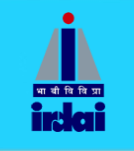IRDAI: The Insurance Regulatory Authority of India
 The IRDAI’s main activity consists in overseeing the financial stability of insurance companies and supervising the operations of various market entities: insurers, reinsurers and intermediaries.
The IRDAI’s main activity consists in overseeing the financial stability of insurance companies and supervising the operations of various market entities: insurers, reinsurers and intermediaries.
lRDAI’s missions
- Protecting the interests of underwriters and ensuring they benefit from fair management,
- Contributing to the rapid growth of the insurance industry, and increasing the sector’s participation in the national economy,
- Establishing, promoting and supervising quality norms and standards: Code of Good conduct, transparent management, financial soundness and corporate competence,
- Ensuring timely processing of insured’s claims and protecting the market against fraud and any other bad practices,
- Ensuring the impartiality and transparency of the relationships between financial markets and the insurance market,
- Setting up a reliable management information system designed to reinforce the standards of insurance companies’ financial soundness,
- Taking remedial measures to ensure compliance with the standards.
IRDAI’s composition
The regulatory authority is composed of ten members nominated by the government including:
- One Chairman
- Five whole-time members
- Five part-time members
IRDAI’s duties and responsibilities
Backed by their teams, the ten members of the regulatory authority are bound by duties and responsibilities towards the companies operating on the market. They shall, in particular:
- Grant, renew, modify, withdraw, suspend or cancel licenses of companies intent on operating or that are already operating on the insurance market,
- Protect the interests of the insured in case of disputes (indemnification, choice of policy beneficiary, …)
- Specify the required qualifications, the code of good conduct and the appropriate training for insurance intermediaries, agents and brokers,
- Publish a code of good conduct for auditors and statutory auditors,
- Promote and coach professional insurance and reinsurance associations,
- Collect royalties in order to finance IRDAI’s missions,
- Carry out inspection and auditing tasks with insurance and reinsurance companies and associations,
- Control and monitor tariffs, terms and conditions of contracts delivered by insurers and reinsurers on the market,
- Establish the form and procedure for the presentation of the accounts and financial statements that insurers and insurance intermediaries are required to submit,
- Supervise the financial investments made by insurance companies,
- Set the level of solvency margin,
- Arbitrate disputes arising between insurers and insurance intermediaries,
- Supervise the activities of the Tariff Advisory Committee (TAC).
(1) R. N. Malhotra : seventeenth governor of the Reserve Bank of India, in office from 4 February 1985 to 22 December 1990
Read also | Indian insurance industry
0
Your rating: None
Tue, 27/10/2020 - 14:32
The online magazine
Live coverage
04/18
04/18
04/18
04/18
04/17
Latest news
